
PHOTO: Stanley Biwott and Eliud Kipchoge celebrate after the 2016 Virgin Money London Marathon (photo courtesy of race organizers)
By Steven Mills, @trackside2016
(c) 2016 Race Results Weekly, all rights reserved
LONDON (24-Apr) — Even without a world record or an Olympic title to his name, Kenya’s Eliud Kipchoge has put together a record befitting the title of the greatest male marathon-runner of all-time. With his second victory in the Virgin Money London Marathon here today in the second fastest time of history of 2:03:05, the 31-year-old has extended his win-loss record to six wins from seven starts. He has run 2:05:30 or faster each time and the average time of his five fastest marathons comes out at 2:04:01 – a time which would have stood as the world record as recently as a decade ago.
In the end, Kipchoge came within eight seconds of the record which currently stands to Dennis Kimetto at 2:02:57 and that record might have been bettered this morning if the conditions cooperated.
“Half the race, we were running against the wind but it was okay,” said Kipchoge when questioned about the conditions by Tim Hutchings during the post-race press conference. “I can’t complain because all of us were facing the same problem.”
Not for the first time, the elite men went out at a furious pace with pacemakers Cosmos Lagat and Gideon Kipketer towing an initial group of nine through 5km in 14:16 and 10km in 28:37, close to two hour-pace for the distance. Kipchoge wasn’t fazed.
“Yes, I knew,” said Kipchoge when asked if he realized he was on such a terrific pace. “I saw the splits.”
The projected winning time began to slow through the second quarter with 15km and 20km reached in 43:17 and 58:10, respectively. A world record hasn’t been set in the men’s race in the London Marathon since 2002, and while this remained an unlikely prospect with so many runners still in contention, the halfway split of 61:24 this morning was the fastest in marathon history by three seconds.
At this point, Kimetto had drifted six seconds off the leading pack while course record-holder Wilson Kipsang, who fell at a drinks station around the 10km mark, and world champion Ghirmay Ghebreslassie from Eritrea both found the pace too much by the 25km checkpoint in 1:12:39.
“It was a good race and I felt OK. I fell down at 10k and the leg was getting painfull [sic] after 25k,” Kipsang later tweeted.
The last pacemaker dropped out shortly afterwards with three athletes still in contention: Kipchoge, New York Marathon winner Stanley Biwott, and three-time Olympic gold medalist Kenenisa Bekele who was in the process of staging a popular return to form after eighteen months of persistent injuries. Bekele surprised reporters by saying he has only managed less than two months’ training before this race but his abbreviated build-up started to become apparent, as he lost ground on the Kenyans just before the 30km checkpoint in a pending world record of 1:27:13.
In contrast, Kimetto passed the same checkpoint in 1:27:38 in the German capital two years ago but thoughts in London at this point began to turn to the victory rather than the time: the 21st, 22nd and 23rd miles of 4:51, 4:47 and 4:50 were among the slowest of the race as Kipchoge and Biwott ran shoulder-to-shoulder for the most part.
But Kipchoge cranked up the pace again with a 25th mile in 4:38 to break away from Biwott. The reigning champion has no aspirations to move back to the track but Kipchoge dug up some of his noted track speed in the closing stages, covering the last 2.2km in one of the fastest splits in history of 6:16.
Kipchoge broke the tape in 2:03:05 and even though he put his hands to his face when he crossed the finish-line, Kipchoge wasn’t frustrated by his near miss.
“I realized I was a few seconds off the world record. It was not really disappointment,” he said on that gesture.
Biwott also joined the sub-2:04 club in second in 2:03:51 while Bekele concluded his return to shape by reaching the podium in third in 2:06:36.
“Running fast at the beginning was really tough for me,” said Bekele, who was only at ninety percent fitness heading into this race.
Ghebreslassie was next across the line in 2:07:46 while Kimetto, who finished third last year, drifted back to ninth in 2:11:44.



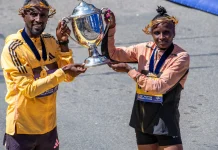
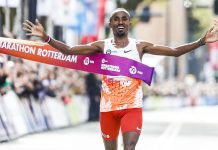
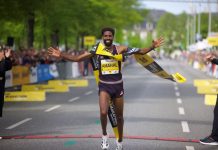
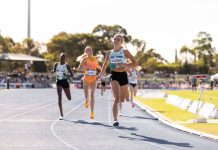
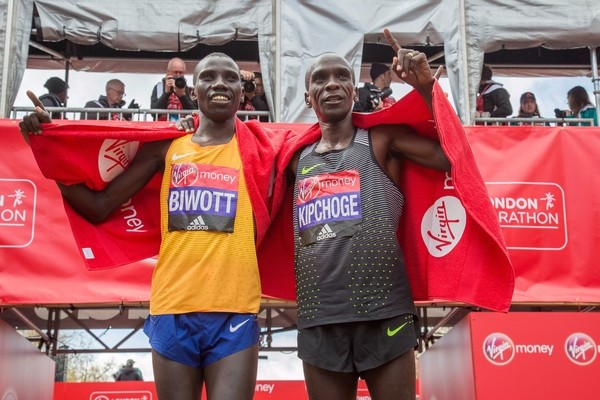

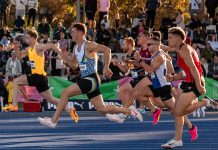
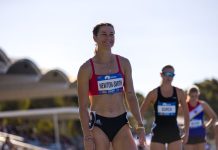
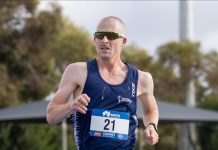

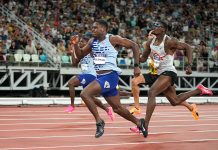













Comments are closed.